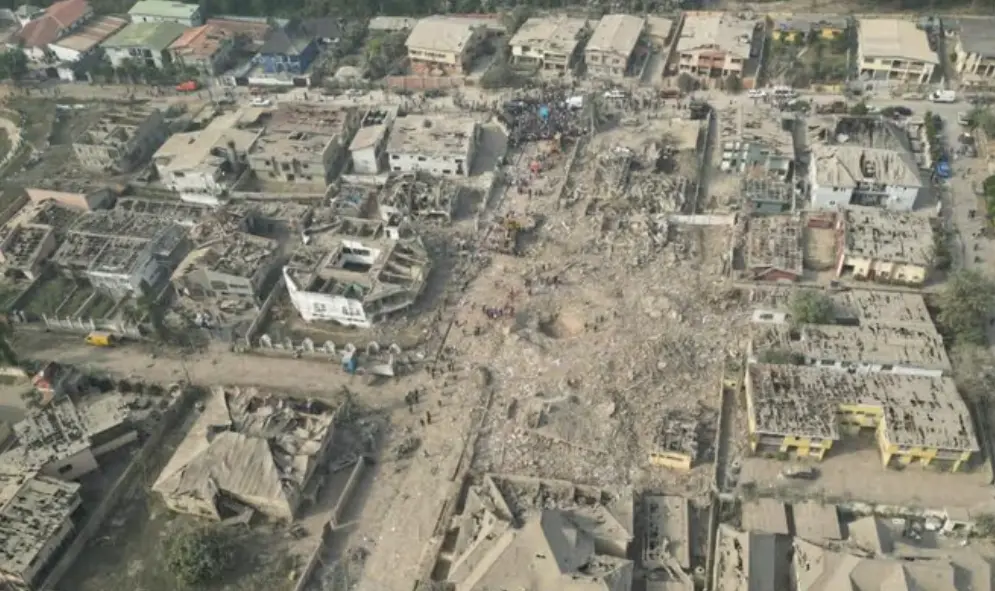The recent explosion in Ibadan, caused by illegal mining activities, has exposed the urgent need for the government to regulate the mining sector in the country. How many Nigerian lives must we lose before the authorities take action to protect the people and the environment from this menace?
The explosion occurred on Tuesday, January 16, 2024, in the Bodija area of Ibadan, the ancient capital of Oyo State. It was so powerful that it rocked the entire city, destroying four houses completely, damaging 10 others severely, and shattering many private and public buildings.
According to a report, all the houses within a 500-metre radius were affected to varying degrees, while over 100 others within a 2,000-metre radius suffered minor damage. Some of the buildings that were impacted included the state secretariat, which is about 1,000 metres away, and the University College Hospital (UCH), which is about 1,500 metres away. The source of the explosion was traced to a fire that broke out at one of the residential houses, which was later discovered to be a hideout for some illegal miners who had stored many explosives there.
The Oyo State Government confirmed that five people died and 77 others were injured in the incident. Governor Seyi Makinde of the state also said the National Emergency Management Agency (NEMA) estimated that 58 buildings were damaged by the blast. The governor added that the illegal miners claimed to have approvals from the federal government, but the authorities “are investigating the incident and will bring the culprits to justice.”
- Narcotics abuse: NAFDAC deploys track and trace mechanisms
- Neglecting retired military personnel not good for Nigeria – NDA alumni
One of the victims of the explosion was a former Deputy Governor of the state, Chief Iyiola Oladokun, who narrated his ordeal to the press. He said he and his family had been rendered homeless by the disaster. “I am one of the residents of Dejo Oyelese Close. My house was affected. We were watching a football match when the explosion occurred. All the doors that were closed were forced open. It was very devastating. All the doors, burglaries, windows and even the roof are gone. We give glory to God that my wife and I were not hurt. I am just coming back now because we can’t sleep here again. We couldn’t sleep here yesterday. We had to move out yesterday.”
Another casualty was a returnee from the United Kingdom, who had arrived in the city a week before his tragic death. According to a family friend, he was planning to start a new life in his hometown after spending many years abroad.
The Ibadan explosion was a tragic reminder of the failure of intelligence in the country, as it exposed the lack of surveillance and monitoring of the mining activities in the area. How could such a large quantity of explosives be stored in a residential area without the knowledge of the security agencies? Does this mean that if the miners were non-state actors stockpiling explosives for use against the state and citizens, they would still have skipped Nigeria’s intelligence and surveillance agencies without notice?
The agencies responsible for such matters should be held accountable and should improve their performance to prevent any future occurrence. The citizens should also be involved in the intelligence-gathering process by reporting any suspicious activities or persons to the authorities.
Illegal mining is a serious problem in Nigeria that poses a threat to the environment, public health, security, and the economy. According to the Nigeria Extractive Industries Transparency Initiative (NEITI), Nigeria lost about N16.25 trillion to illegal mining between 2009 and 2020. It has also been linked to the proliferation of explosives, banditry, and human trafficking in the country.
We commend the Federal Executive Council for setting up a committee to review the laws governing the control of explosives in the country, in response to the explosion. The committee aims to determine if any laws were violated by the illegal miners identified in the initial investigations. Yet, we wonder why a measure that should have been proactive was left until this much damage was done.
But beyond what the committee plans to achieve, the government must also strengthen the capacity and coordination of the relevant agencies, such as the Ministry of Mines and Steel Development, the Nigeria Police Force, the Nigeria Security and Civil Defence Corps, and the National Environmental Standards and Regulations Enforcement Agency, to enforce the mining laws and regulations and to monitor and control the use of explosives in the country.
There is also the need to strengthen the legal and institutional framework for the intelligence and security sector and to foster collaboration and cooperation among the various intelligence and security agencies, to avoid duplication, conflict, or gaps in their operations and responsibilities, and also by encouraging the participation and cooperation of the citizens and the civil society, by creating awareness and sensitization programmes, establishing feedback and reporting mechanisms, and protecting the rights and interests of the whistleblowers and informants. Let this blast be the last.

 Join Daily Trust WhatsApp Community For Quick Access To News and Happenings Around You.
Join Daily Trust WhatsApp Community For Quick Access To News and Happenings Around You.
